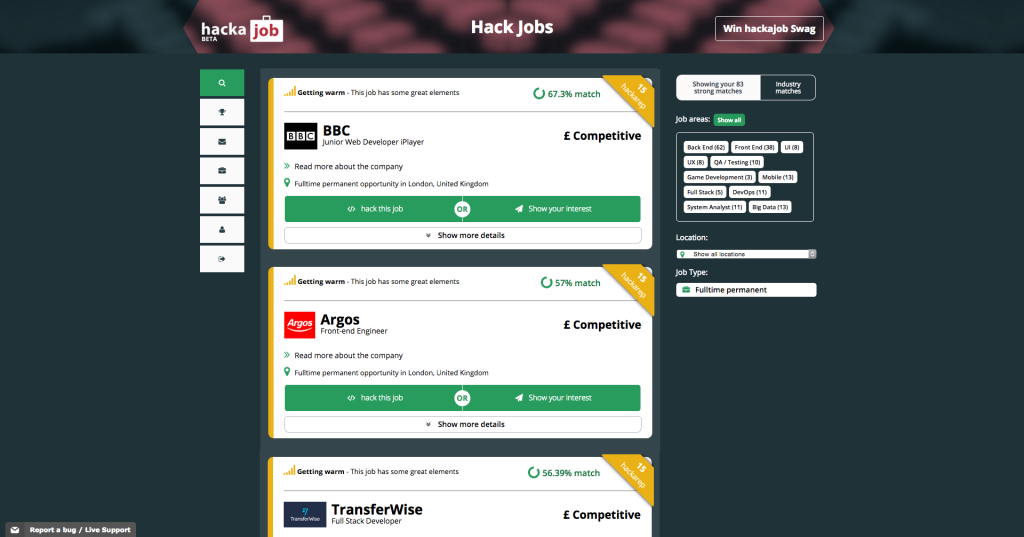Recent additions to the techstars London programme, Hackajob are changing the way employers locate the right candidates. Co-CEO Mark Chaffey shares his thoughts.
Let’s make this clear from the get-go: attracting the right talent is difficult, let alone hiring the perfect technical candidate. Whether you are a budding startup or a globally-recognised enterprise, the issues faced are generally shared (bar a few exceptions, such as brand recognition). They range from prolonged discovery and selection processes, to filtering out time wasters, to persuading passive candidates. The process, however, is a two way street: technically talented individuals must try their best to convince you that they’re right for you, and you have to convince them that your company is the right place for them.
At the end of the day, you have to try and succeed with what you can do from your half of the court. That said however, here are five common pitfalls we’ve seen from our data and experiences, in trying to attract the right technical talent.

1. Failing to distinguish your company
Believe it or not, you’re not the only company after the right talent. The tech sector is among the most severely affected right now, with Tech City UK’s 2015 Tech Nation report finding 33% of companies noted that hiring tech talent was their biggest barrier to growth. There is a growing shortage, which, according to Russ Shaw, is predicted to reach 300,000 by 2020.
Your company will need to do everything it its power to create a compelling, unique proposition for tech talent, as at the heart of a great company is its people.
2. Making the search too specific
Every tech role’s job specs are unique to the needs of the company – that much is valid. But the more it becomes overly specific, the narrower and narrower your initial pool of talent becomes. If you need a candidate that knows PHP, Ruby, and Java, or someone who works using the MEAN stack, your options are narrow from step 1. YES, you want that right guy or girl, but as the third point illustrates, you need to be flexible in this regard.
Someone with proficiency in JavaScript that has the drive to learn new technologies, could learn a new framework such as Node.js or Angular.js in a month or two. Narrowing your search to candidates that are already proficient in niche frameworks will severely limit your talent hunt.

3. Being inflexible about the job specification
This point extends from the previous one concerning too specific a candidate search: so what if they don’t meet your requirements? They just don’t meet your requirements yet. Forward thinking companies are hiring on aptitude, not skillset. If someone demonstrates a strong ability in PHP, they could most likely learn Ruby or a nice language like Groovy quickly. Sometimes aptitude, rather than skill set, is of greater relevance.
If a candidate is as good you want them to be, and has the passion to boot, they will take on the challenge of learning the languages missing in their arsenal, and meet the desired job spec. In fact, a report by Robert Walters UK found 42% of employers are upskilling current staff.
4. Failing to consider a candidate’s worth
In a previous blog post (which can be seen here), we found that techies were 57% more likely to apply for a job if they knew the salary in advance, rather than the cliched ‘Competitive’ descriptor. What resulted was a fantastic discussion (which can be found on Hacker News here). Some defended not knowing, some demanded to know salary ranges, and others attacked whether companies really knew the value of the tech talent that they were hiring for, and even further, trying to hire candidates who themselves didn’t know their own worth. Commentator ‘allwein’ for example stated salary ranges would give him a quick and easy way of weeding out “companies which aren’t serious without a significant investment of my time.”

Perhaps you can’t pay their desired salary, but salary isn’t the only form of compensation. Equity stakes, and a wide array of benefits and perks could be used to meet the needs of the talent you want. Healthcare, dental plan (“Lisa needs braces”), daycare, travel, spending money, endless numbers of Macs, food, beer, office perks, the list goes on.
They need to fit your company culturally and technically, but, especially if they’re a passive candidate, they may need some convincing, and to be shown how much you would value them at your firm.
5. There is no silver bullet
Although we’re close to building one, in terms of tools and channels, there is no single, silver bullet for every technical talent you need. That isn’t to say the avenues that exist are all bad. Some, in fact, are fantastic (such as hackajob, wink wink). But they need to be used collectively and in a coordinated fashion to meet your own company’s needs. Referrals, job boards, social networks and online communities, should all be leveraged to your advantage.
Takeaways
Companies need to distinguish themselves from the noise of competition, especially amongst increasing skills shortages. The more specific a job spec is, to the point where it’s pedantic, the fewer and fewer potential candidates there are – especially for those searching. Candidates are capable, just perhaps not in one skill that you seek – this can be taught.
Candidates should be flexible enough to learn what the company requires of them, but so must companies and accept that great candidates may not know everything required, but they shouldn’t be discounted. They might be the unpolished diamond that drive your business forward.
Mark Chaffey is the Co-CEO of hackajob, an online marketplace for companies to source and screen technical talent, whose challenge-driven platform includes clients like the BBC and Future Fifty company TransferWise.



